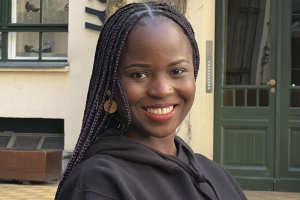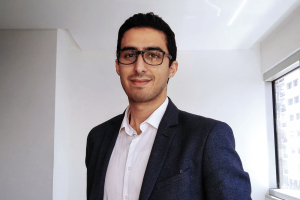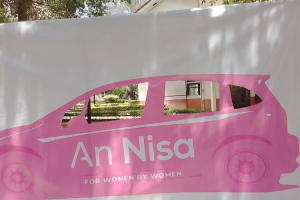Norbert Haguma Deploys Asset-Financing Solution for Rwandan Drivers
- Norbert Haguma founded Swapinga in February 2025 to provide vehicle financing for micro-entrepreneurs.
- The platform requires a 20% down payment and approves applications within seven days without demanding real estate collateral.
- Haguma brings experience from previous roles at Smart Africa, SPENN Technology, and NALA.
Entrepreneur Norbert Haguma is reshaping economic inclusion in a sector where financing remains a major hurdle. He utilizes technology to transform how drivers access their work tools.
Norbert Haguma specializes in fintech, mobility, and Africa-China relations. He serves as the founder and CEO of Swapinga. The company focuses on financial technologies and mobility solutions. Haguma established the firm in February 2025. Swapinga targets drivers and micro-entrepreneurs who seek vehicle ownership. The platform offers a simplified financing solution to boost their revenues. The company aims to remove the primary barriers regarding access to automotive credit.
The system relies on a four-step process. The candidate submits a request via an online form. The team reviews the file and provides an answer within seven days. Successful applicants must open a bank account. They subsequently pay a 20% down payment on the purchase amount. The driver then takes possession of the vehicle to launch or expand their business.
Swapinga promotes a model that requires neither land nor housing as collateral. This feature is decisive for drivers who traditional banks often exclude. The enterprise specifically targets actors in the taxi ecosystem and mobility platforms such as YEGO.
Haguma holds a seat on the board of the Pan-African Council. This organization commits to the unification of Africa and its diaspora. He also acts as a Senior Associate at Africa Equity Group. This firm provides operational consulting, market analysis, and financial support.
Haguma created his first enterprise, AfrOrient Group, in China in 2009. The company operates in trade and investment. He subsequently co-founded the edtech startup Kiziga in China in 2012. This startup develops a platform that allows Africans to apply, pay, and obtain documents for studies in China. He participated in the creation of AfricaGen in Kigali in 2018. This organization dedicates itself to mobilizing Africans through technology.
Norbert Haguma holds a degree from Beijing Jiaotong University. He obtained a bachelor's in computer science and technology and a master's in business administration there. He joined the Embassy of the Republic of Rwanda in China as an IT engineer in 2009.
Haguma became the head of the Blockchain Hub and the African hub for digital transformation at Smart Africa in 2018. He worked at SPENN Technology from 2020 to 2024. He successively occupied the positions of Country Director for Rwanda, Head of Africa Partnerships, and Non-Executive Director. He served as Country Director for the fintech NALA in Rwanda between September 2024 and February 2025.
This article was initially published in French by Melchior Koba
Adapted in English by Ange Jason Quenum
Foluso Ojo Connects Drivers, Individuals and Businesses Across Africa
• Nigerian entrepreneur Foluso Ojo co-founded truQ to digitize and streamline logistics.
• truQ connects companies with nearby vehicles to cut delays and increase transparency.
• The start-up won Lagos AOT mobility award in 2022 and ranked among Nigeria’s top 10 innovators in 2023.
Foluso Ojo, a Nigerian tech entrepreneur, co-founded and now leads truQ, a logistics start-up that aims to digitize and optimize freight transport across Africa.
Founded in 2020, truQ operates a platform that connects businesses with available logistics vehicles nearby. The system enables faster and more efficient transport of goods.
The start-up works as digital infrastructure for third-party logistics providers, helping reduce delays, optimize routes and make operations more transparent.
truQ explained: “On the users’ side, we save them the stress of making several phone calls to different vehicle owners each time they need to move something, spending time negotiating prices, and depending on a driver’s availability, with occasional disappointments.”
Ojo graduated from Adekunle Ajasin University in Nigeria with a bachelor’s degree in communication in 2014.
She began her career in 2012 as an intern at public relations firm CMC Connect. In 2016, she joined Nigerian management company Brooks and Blake as a project manager.
In 2020, she became community manager at eTradeforWomen, an initiative that supports female digital entrepreneurs.
truQ’s progress has earned industry recognition. In 2022, the start-up was named best mobility start-up of the year at the Art of Technology (AOT) Lagos event.
In 2023, it was ranked among Nigeria’s top 10 most innovative companies by NSIA Group, a financial services firm specializing in banking and insurance.
This article was initially published in French by Melchior Koba
Adapted in English by Ange Jason Quenum
Wayne Venter Uses Virtual Reality and IoT to Transform Industrial Sites
Wayne Venter, a South African entrepreneur and engineer, develops cutting-edge software solutions to meet industrial needs. He founded Nulitics in 2017, a company that builds technology tools for industrial players.
Based in Johannesburg and expanding to Houston, Nulitics creates software using augmented reality, Internet of Things (IoT), and digital twin technologies. The company blends machine vision, user experience, and digitized operations to help clients improve productivity, safety, and access to information.
Nulitics offers augmented reality tools that support work in industrial, maintenance, commercial, and training sectors. Through digital twins, it builds 3D scans and connected virtual models of industrial plants, integrating real-time sensor data for better monitoring.
Nulitics develops its own products and ensures they work with hardware partners like Microsoft, Vuzix, and RealWear. This independence allows the company to tailor solutions effectively for various client needs.
Wayne Venter also leads Dulcet Consulting, a technology advisory firm. Before Nulitics, he founded Ionizr in 2016, specializing in mobile analytics and marketing campaign delivery, serving as its CTO until 2018.
He holds a double bachelor’s degree from the University of Pretoria in computer security and information systems, earned in 1993. He completed a Master’s in Information Technology from the University of Liverpool in 2013.
Venter began his career in 1990 as a network administrator at the University of Pretoria. He worked as a solutions architect at Avaya between 2012-2014 and as a pre-sales systems engineer at Ruckus Wireless from 2014-2015. Between 2015 and 2016, he directed SkyFii operations in the Middle East and Africa.
This article was initially published in French by Melchior Koba
Edited in English by Ange Jason Quenum
Hicham Zouaoui Revolutionizes Long-Distance Travels With Carpooling Platform Pip Pip Yalah
He aims to help maintain a healthy environment and make life easier for Moroccan travelers. An entrepreneur specializing in mobility, he has received several awards for the impact of his solution.
Hicham Zouaoui (photo), a Moroccan entrepreneur and computer scientist, is the co-founder and CEO of Pip Pip Yalah, a startup aimed at simplifying and reducing the cost of travel for Moroccans through a long-distance carpooling platform.
Established in 2018 by Zouaoui and Otman Harrak, Pip Pip Yalah connects drivers embarking on long journeys with passengers via its namesake app, to cut travel expenses and CO2 emissions.
The concept of Pip Pip Yalah originated in 2013 as a Facebook page where drivers used to post their offers and interested passengers responded by commenting or sending private messages. “The social network allowed us to test the market fit of the concept freely and organically,” Zouaoui stated.
Boosted by Orange Fab, the startup has amassed a community of over 400,000 members and has facilitated more than 1,000 journeys across Morocco.
Zouaoui, a graduate of Moulay Ismail Meknes University, earned a bachelor’s degree in computer engineering in 2011 and a master’s degree in quality, health, and safety management from Ibn Tofail University in 2015.
He started his professional career in 2014 at Webhelp, a data company, serving as the continuous improvement manager. In 2017, he joined CloudControl, a software company, as a global key account manager. In 2021, he became a partner at Ideancy, a creative agency specializing in digital communications consultancy and web marketing in Morocco and France.
Zouaoui has been recognized with several awards for his impactful contributions. In 2020, his Pip Pip Yalah solution was honored as the best application of the year at the Maroc Web Award. That same year, he secured the second prize at the Orange Social Venture Prize POESAM in Morocco.
Melchior Koba
Namibia: Lefa connects drivers and passengers
In Africa, there is a growing presence of e-mobility companies. Multinationals like Uber and Bolt coexist with local initiatives on the continent.
Lefa is an e-mobility solution developed by an eponymous Namibian startup. It enables users to easily send drivers on their errands.
Through its Android and iOS apps, a user can create an account by entering his/her phone number and a valid email address. Once this step is completed, users can start ordering cabs. The process is simple. They just need to enter their destination to get things started. To make the order process even simpler, Lefa has a feature to save favorite destinations.
The solution offers various types of cars and rates, depending on users’ preferences. Its applications integrate real-time monitoring features as well as several payment methods. Nevertheless, users can also pay for their rides with cash.
"LEFA charges a minimum of N$40.00 per trip. Fares are calculated based on the distance and duration of the ride at N$4.00/kilometer plus N$3.50/minute rate. Once you enter your pickup and dropoff address, the LEFA app will automatically calculate the fares before you confirm your trip. LEFA offers no fixed fares or surge pricing," the startup explains in its FAQ section.
In addition to on-demand errands, the start-up also offers a variety of services such as personnel transport, event transportation solutions, and parcel delivery services.
Since its launch, its Android app has been downloaded more than 10,000 times, according to Play Store data.
Adoni Conrad Quenum
Sudanese Start-Up Tirhal Competes with Giants in e-Mobility Sector
The African e-mobility sector is attracting giants from all over the world. In Sudan, a tech entrepreneur has partnered with his friends to establish a solution to compete in his country.
Tirhal is a technological solution developed by a Sudanese start-up. It connects passengers and drivers in four regions of Sudan. Based in Khartoum, the start-up was founded in 2016 by Mohamed Elzakey, Omer Elzakey, Yaser Abba, and Siddig Eltaj. Since its launch, it has already raised approximately $500,000 to support its growth and develop its technology.
"Tirhal's vision is to work to facilitate people's lives by providing various transport services that suit all groups," the platform states.
The mobile App is available on iOS and Android. Users register by creating an account, allowing them access to various features of the app. To take a ride, users simply input their destination, the type of vehicle, and the starting point, and Tirhal displays the fare for the ride. It is also possible to book a taxi for a future ride.
The start-up also offers delivery services, such as delivering parcels and taking orders from restaurants. Tirhal has a fleet of more than 200 motorcycles. For taxis, the start-up works with 2,900 vehicles that have already traveled more than 100,000 kilometers. A laudable record, despite rocky beginnings.
"When we started, we only had three cars, my uncle's and two of my friends'. Today, we have 45,000 drivers and 4.5 million customers," Mohamed Elzakey explained in 2019.
Tirhal charges 10% of the ride fare. This is a low percentage compared to what start-ups operating in the sector earn. However, this strategy, coupled with the quality of the fleet's vehicles, has allowed the start-up to dominate the Sudanese market. According to Play Store statistics, the Android version of the application has already been downloaded more than a million times.
In 2023, it was among the finalists of the AfricaTech Awards, an event that took place last June 15 on the sidelines of the Parisian technology exhibition, VivaTech.
Adoni Conrad Quenum
In Togo, Lomé Taxi offers web and social network-based VTC services
After spending several years in the US, Afery Johnson (picture on the left) returned home to Togo, and set up his transport startup.
Lomé Taxi is a ride-sharing solution developed by a young Togolese company. It allows customers heading in the same direction to share transportation costs. Through this solution, users can travel around the city in cars at affordable rates. Already, the startup operates in 11 designated zones within the urban area of Lomé.
"The carpooling concept at Lomé Taxi emerged from the need to lower transportation costs for our customers. Faced with the repetitive rise in fuel prices, we had to increase our fares, and we noticed a decline in the use of our services due to the high cost of living. Through careful consideration, we found a solution that would allow our customers to continue using our services affordably," said Afery Johnson, founder of Lomé Taxi.
The solution does not require a mobile application. Users can easily access it through a web browser. To do so, they only need to provide information such as the departure date, departure time, departure neighborhood, destination, phone number, email address, and the number of passengers. The last piece of information is necessary to notify the start-up that you are open to sharing your ride with another person.
Besides the web platform, reservations can also be made through social media platforms like WhatsApp. SMS and direct calls are also available methods for contacting the start-up to make a reservation.
Lomé Taxi boasts a fleet of over 25 cars and operates from five offices across the Togolese capital. The fare for a trip downtown is CFA2,000, and CFA3,000 for trips to peripheral areas. The startup also offers a special service for people visiting the country.
"The driver picks them up from the airport to their place of residence. For those who no longer want to rent expensive cars during their stay, the company owner provides his car fleet at very affordable rates, tailored to their schedule," according to the platform.
Adoni Conrad Quenum
Senegalese Entrepreneur Moustapha Ndoye Digitizes Road Transport by Connecting Shippers with Carriers
He founded a company that digitizes the transportation sector and connects freight shippers and carriers. Backed by several investors, the company collaborates with major transport companies.
Moustapha Ndoye (see picture) is a Senegalese computer scientist and graduate of the Georgia Institute of Technology. With Alioune Ndoye, he co-founded Chargel, a logistics technology startup created in 2021. The company's mission is to make road transport more efficient, reliable, and transparent.
The startup helps carriers find freight at any time via its platform. This helps the users avoid empty trips while enjoying prompt payments. In addition, it offers value-added services such as the supply of GPS trackers, assistance in purchasing fuel at discounted rates, and support for repairs in case of breakdown.
With his startup, Moustapha Ndoye, its CEO, hopes to build the largest network of road freight transport in French-speaking West Africa. This will facilitate shippers' access to thousands of trucks at the best prices.
In April 2023, the company successfully raised $2.5 million to expand its operations in Senegal and neighboring countries such as Mali, Guinea, and Mauritania. Chargel has recently been selected for the Google for Startups Black Founders Fund and was ranked among the top 20 African startups to watch in 2023 by Jeune Afrique magazine.
Since its launch, Chargel has entered partnerships with several global giants, including Maersk and Grimaldi. In 2022, the company recorded a gross merchandise volume of $1.2 million.
Before starting Chargel, Moustapha Ndoye was the CEO of Xtreme Design and Engineering - an iOS mobile application development company, from 2009 to 2018. In 2013, he co-founded Teranga Solutions, a company that provides an outstanding hotel experience by leveraging mobile and cloud technologies.
After serving as CEO of Teranga Solutions, he became the Chief Operating Officer of HotelOnline in 2018. In 2020, he joined Wave Mobile Money as Director of Products until the launch of Chargel the following year.
Melchior Koba
An Nisa Taxi, a Kenyan women-only on-demand transport service
While on-demand transport services are undeniably useful, they are not without their problems. In particular, women who use these services have reported incidents of harassment, which highlights the need for measures to improve safety in the on-demand transportation sector. An Nisa Taxi is one such solution that seeks to make the industry safer for women
An Nisa Taxi is a women-only taxi service developed by a Kenyan start-up. It allows women to commute safely without being harassed and enables women drivers to do their jobs peacefully. According to founder Mehnaz Sarwar, the startup has a team of women drivers and caters to women and children. “We also offer monthly packages for parents and working women. [...] We empower our drivers by offering them better rates while working in a safe environment for both our drivers and customers,” she added.
Currently, the solution only has an Android app, with the iOS version still under development. Using the app, users can create An Nisa accounts and access various services. They only need to choose the type of car they want, and depending on the route and location, the app suggests the closest driver. Users can then book their rides, wait for the driver to arrive -and even follow them in real-time- and pay. An Nisa Taxi's policy is so strict that a woman cannot take a cab with her partner unless it's an emergency.
An Nisa derives its revenues from subscriptions, partnerships with companies, and margins on daily rides. The startup collects a 15% commission on the rides performed by its “self-employed” drivers. To work with An Nisa, drivers need to own their cars and pass the verification process.
The startup is still self-financed and has not yet attracted outside investments despite its strong growth in recent years. According to its figures, it reached the 10,000-user mark this year and hopes to expand to Saudi Arabia, where it has many partners.
Adoni Conrad Quenum
Vite provides on-demand transportation and last-mile parcel delivery services in Mauritius.
The solution was launched by two foreign students in Mauritius as they believe the country is the best place to start, to quickly penetrate Southern African markets.
Vite is a digital solution developed by a Mauritian start-up. It allows users to book rides and parcel deliveries.
Through its mobile app, accessible on Appstore and Playstore, users can use its on-demand transportation services or even request the delivery of items like food, spice, etc as well as send for an errand. The platform integrates a WhatsApp link for users to report any issues that arise.
The solution claims more than 700 partner drivers, over 10,000 customers served and more than 24,500 trips and orders completed. To improve its efficiency, it is partnered with various entities. For example, it provides delivery services to more than 250 restaurants.
Based in Grand Bay, its founding startup was launched, in 2017, by Isaac Agyemang and Ukeme Augustine Jonah, two foreign students. Commenting on why it was launched in Mauritius, Vite’s chief marketing officer Anthony Takyi said: “If you are going to do business and get things smoother than smooth in Africa, Mauritius is certainly the starting point. It is the gateway to the SADC region.”
In 2020, the startup completed a funding round of an undisclosed amount to develop its technology and accelerate its growth. It is growing steadily and hopes to expand into the sub-region in the coming years. To date, its Android app has been downloaded more than 10,000 times from PlayStore.
Adoni Conrad Quenum











